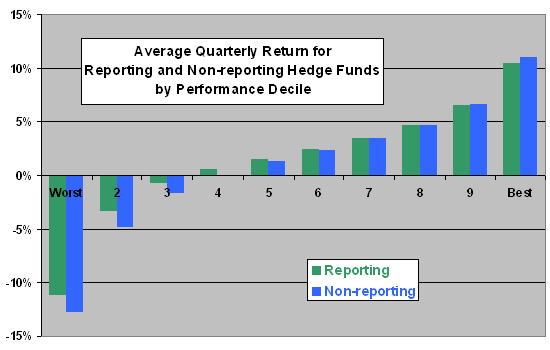Are hedge fund industry performance metrics, which are based on voluntarily reported data, materially unrepresentative? In their November 2009 draft paper entitled “Out of the Dark: Hedge Fund Reporting Biases and Commercial Databases”, Adam Aiken, Christopher Clifford and Jesse Ellis compare directly the performances of funds that choose to report and funds that do not. They calculate return data for non-reporting funds by examining the holdings described in SEC filings of 117 publicly listed (registered) funds of hedge funds. Using quarterly return data for reporting and non-reporting hedge funds spanning 2000-2008, they conclude that:
- On average, voluntarily reported hedge fund data overestimates managerial skill. Depending on the definition of alpha used, this bias accounts for 13%-63% of average hedge fund quarterly alpha.
- This bias is asymmetric, excluding some of the worst and best performing funds. The worst 10% of self-reporting funds outperform the worst 10% of non-reporting peers by 0.56% per quarter, while the best 10% of self-reporting funds underperform the best 10% of non-reporting peers by 0.44% per quarter (see chart below). This result is consistent with assumptions that the worst performers are more likely to hide their results and that the best performers are less likely to need marketing via a database.
- Commonly used measures of tail risk are larger for non-reporting funds than for self-reported funds, indicating that self-reporting may underestimate hedge fund industry risk.
- The 106 hedge funds that stop reporting to commercial databases but continue to appear in non-reported data during the sample period tend to underperform both their own prior returns and the industry after delisting.
The following chart, constructed from data in the paper, compares average quarterly returns for reporting and non-reporting hedge funds by performance decile. It shows that non-reporting funds tend to underperform reporting funds for lower deciles but outperform for higher deciles. In other words, both the worst-performing and best-performing funds are less likely to report their performances than are other funds.

In summary, evidence indicates that self-reported hedge fund performance data tends to overstate hedge fund industry return and understate risk.
A broader message is that investors should be skeptical about the representativeness of voluntarily provided data.